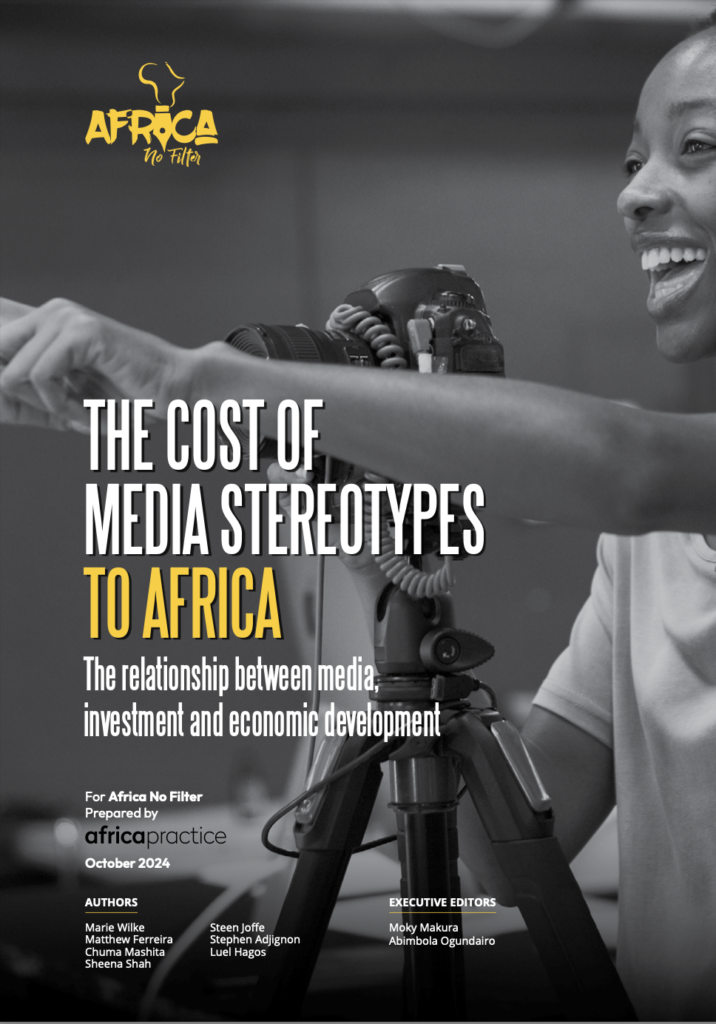The study highlights the significant cost burden that biased media coverage imposes on African nations, particularly during electoral periods, ultimately deterring foreign direct investment (FDI) in a continent known for its low default rates and high returns in strategic sectors.

LONDON/LAGOS/JOHANNESBURG/NAIROBI, 10 October 2024 -/African Media Agency(AMA)/-New research conducted by Africa No Filter and strategic advisory firm Africa Practice reveals that African nations pay 4.2 billion dollars on debt servicing alone.
The study, titled The Cost of Media Stereotypes to Africa, employs a combination of quantitative analysis and qualitative insights to explore the financial repercussions of media bias. The research focuses on electoral processes in four African nations: Kenya, Nigeria, South Africa, and Egypt, comparing media coverage with that of Malaysia, Denmark, and Thailand – nations with similar country risk profiles.
The economic impact of biased media reporting
To estimate the economic cost of biased media coverage, researchers calculated potential savings in debt servicing costs for Nigeria, Kenya, Egypt, and South Africa. The study used academic estimates indicating that media sentiment can influence borrowing interest rates by up to 10%, with a 10% improvement leading to a 1% decrease in rates.
By comparing actual debt servicing costs with those adjusted for improved media sentiment, the researchers estimated potential savings of up to 0.14% of GDP per year. Extrapolating this to the entire continent, Africa loses up to $4.2 billion annually due to unrepresentative negative media narratives.
To put this figure into perspective, $4.2 billion could fund the education of over 12 million children in Africa – the population of Tunisia. It could provide immunizations for over 73 million children – more than the combined populations of Angola and Mozambique. It can provide clean drinking water to over two-thirds of the entire population of Nigeria, the most populous country on the continent at 220 million people.
Key findings:
Financial impact: The study estimates that the premium on debt servicing costs African countries $4.2 billion each year. This amount could fund the education of over 12 million children, provide immunisations for more than 73 million children, or ensure clean drinking water for two-thirds of Nigeria’s population.
Media bias during elections: The research focuses on media coverage during elections in four African countries—Kenya, Nigeria, South Africa, and Egypt—compared to non-African nations like Malaysia and Denmark. It found that negative narratives dominate the discourse around African elections, with 88% of media articles about Kenya during its election period reported as negative, compared to only 48% for Malaysia.
Economic consequences: By analysing potential savings in debt servicing costs for Nigeria, Kenya, Egypt, and South Africa, researchers found that improved media sentiment could reduce borrowing interest rates by up to 1%, translating to potential savings of $4.2 billion annually across the continent.
Call for better representation in the media
As the African Union moves toward establishing its own Africa Credit Rating Agency to address the perspectives that currently inform the ratings, there is a growing movement to challenge the biases inherent in the global financial system and to examine the role media has. The agency aims to provide a fairer, regionally based analysis of sovereign risk, moving away from the pessimistic assumptions often made by international rating agencies with limited local presence.
“The scale of these figures underscores the urgent need to challenge negative stereotypes about Africa and promote a more balanced narrative,” stated Moky Makura, Executive Director, Africa No Filter. The report emphasises that while Eurobond debt servicing constitutes only 6% of Africa’s financing portfolio, further exploration into other financial inflows is essential to fully understand the extent of the premium affecting African nations.
The findings underline the need for a recalibration of global media representations of Africa, urging for more accurate portrayals that reflect the continent’s diverse realities.
“Current global media reporting often exaggerates the risks associated with doing business in Africa, contributing significantly to the premium that hampers investment,” added Marcus Courage, CEO Africa Practice.
The study serves as a clarion call for stakeholders in both media and finance to work collaboratively towards fostering a more equitable representation of Africa. By addressing these biases, substantial investment can be unlocked.
Distributed by African Media Agency on behalf of Africa No Filter.
Notes to editors: download full report here:
https://africanofilter.org/our-research/the-cost-of-media-stereotypes-about-africa
For more information, please contact:
Lerato Mogoatlhe
E: lerato@africanofilter.org
About Africa Practice
Africa Practice is a mission-led strategic consulting firm advising investors and development partners across the African continent. The firm operates from nine hub offices, supplying insights and advocacy solutions to corporations, investors, governments and foundations, enabling them to see more clearly, engage with confidence and unlock value to drive sustainable and equitable development. www.africapractice.com
About Africa No Filter
Africa No Filter is an advocacy organisation that is shifting stereotypical narratives about Africa through storytelling that reflects a dynamic continent of progress, innovation, and opportunity. The donor collaborative is funded by Ford Foundation, Bloomberg, Andrew W. Mellon Foundation, Luminate, Open Society Foundations, Comic Relief, the Hilton Foundation, the British Council and Hewlett Foundation. www.africanofilter.org

